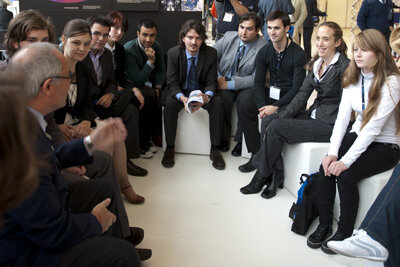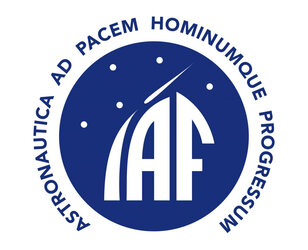European students participate in IAC 2010
Students from all over the world attended the 2010 International Astronautical Congress (IAC), which took place in Prague, capital of the Czech Republic, 27 September – 1 October. Among the attendees were 16 students sponsored by ESA.
The IAC is one of the most important and prestigious events in the space calendar. As usual, the International Space Education Board (ISEB) – this year chaired by ESA - organised a special, four-day programme for the ISEB-sponsored students that complemented the regular conference programme.
This was preceded by an orientation day on Sunday, 26 September, when the attendees were able to mix and become acquainted. For the first time, the activities included an informal "Space Bodies" lunch with ISEB representatives and agency Heads of Education. This informal session gave the students a unique opportunity to ask questions and share views with senior agency representatives about the respective education and space programmes.

Attendance at the Congress offered a great opportunity for the students to attend lectures by leading scientists and engineers from around the world. It also enabled the students to meet other young space professionals who recounted their own experiences and career development.
All of the ISEB-sponsored students presented papers in the IAC regular conference sessions. They were also able to attend each others’ presentations and learn about their research.
Apart from the IAC official conference programme, the main student activities of the week took place in the International Student Zone, where the participants were able to present their research, display their posters and share their ideas and experiences. The programme organised by the International Space Education Board (ISEB) offered eight lectures by experts from all the space agencies on a wide range of topics.
In particular, the final day of the ISEB programme, 1 October, was organised by ESA. This included two keynote presentations by ESA experts. Giorgio Saccoccia, Head of the Propulsion and Aerothermodynamics Division, spoke about Propulsion Systems for ESA missions. He was followed by Andrea Accomazzo, Rosetta Spacecraft Operations Manager, whose subject was Operations on ESA’s scientific missions.
Much of the morning session was taken up with informal student presentations, including:
- Ulrik Rasmussen and Philipp Reiss, presenting on their experiences with the Rexus and Bexus programmes.
- Alessandro Migliaccio, presenting a physical model of an advanced Micro-thruster and the testing performed.
- Charlotte Lücking, giving an overview of her group’s interesting research activities at the Advanced Space Concepts Laboratory, Strathclyde University.
- Chiara Massimiani, presenting her involvement in past and upcoming CubeSat intiatives.
- Anna Shvetsova, giving a presentation and demonstration of her novel (and fully functional) Venus rover prototype.
- Alison Gibbings and Federico Zuiani, presenting their work on orbit determination and control for the European Student Moon Orbiter (ESMO).
The latter two ESA-sponsored students were also awarded the Hans von Muldau prize for the best student group presentation in the official IAC programme.
Another of the IAF student award winners was young professional Max Roessner from the Technische Universität München, Munich, Germany. Max won first prize in the graduate category for his paper Broadband Light Source for Fiber-Optic Measurement System in Space Applications. He is currently involved in the European Student Moon Orbiter (ESMO) ground station, having previously worked on the European Student Earth Orbiter ESEO ground station.
Background

The International Astronautical Congress takes place in a different location each year. More than 3,400 people, including 542 students, attended the 2010 conference. The theme of the 61st IAC was “Space for human benefit and exploration”. The event was organised by the International Astronautical Federation (IAF) and the Czech local organising committee. The 62nd IAC will be held 3-7 October 2011 in Cape Town, South Africa.
The IAC Student Participation Programme is an initiative of the International Space Education Board (ISEB), established by ESA, NASA, JAXA, and CSA, and with participation from CNES and VSSEC. ISEB members sponsor students to participate in educational activities and programmes, in order to inspire young scientists and engineers, and to ensure the long term availability of a well-qualified space workforce.















 Germany
Germany
 Austria
Austria
 Belgium
Belgium
 Denmark
Denmark
 Spain
Spain
 Estonia
Estonia
 Finland
Finland
 France
France
 Greece
Greece
 Hungary
Hungary
 Ireland
Ireland
 Italy
Italy
 Luxembourg
Luxembourg
 Norway
Norway
 The Netherlands
The Netherlands
 Poland
Poland
 Portugal
Portugal
 Czechia
Czechia
 Romania
Romania
 United Kingdom
United Kingdom
 Slovenia
Slovenia
 Sweden
Sweden
 Switzerland
Switzerland




























